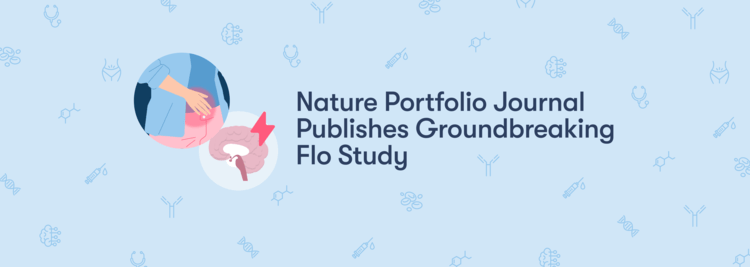Nature Portfolio Journal: Mental Health Research, one of the most highly esteemed journals within the global scientific community that only accepts the highest quality and novel research relevant to all aspects of mental health disorders and wellbeing. This paper resulted from a collaboration between Flo and Professor Sarah Garfinkel from University College London
-
Tracking cycle
-
Getting pregnant
-
Pregnancy
-
Help Center
-
Flo for Partners
-
Anonymous Mode
-
Flo app reviews
-
Flo Premium New
-
Secret Chats New
-
Symptom Checker New
-
Your cycle
-
Health 360°
-
Getting pregnant
-
Pregnancy
-
Being a mom
-
LGBTQ+
-
Quizzes
-
Ovulation calculator
-
hCG calculator
-
Pregnancy test calculator
-
Menstrual cycle calculator
-
Period calculator
-
Implantation calculator
-
Pregnancy weeks to months calculator
-
Pregnancy due date calculator
-
IVF and FET due date calculator
-
Due date calculator by ultrasound
-
Medical Affairs
-
Science & Research
-
Pass It On Project New
-
Privacy Portal
-
Press Center
-
Flo Accuracy
-
Careers
-
Contact Us
Nature Portfolio Journal Publishes Groundbreaking Flo Study: Exploring Effects of Acute Stress on Pain Perception Among Women during the Russia-Ukraine Conflict


In a study published in Nature Portfolio Journal: Mental Health Research, part of Nature's prestigious and highly reputable family of publications, Flo has delved into the effects of acute stress on pain perception among females during the Russia-Ukraine conflict. Acute stress, linked to decreased pain sensitivity — known as 'stress-induced analgesia' (SIA)—has traditionally been studied in laboratory settings. This research, however, is the first to unravel the complexities of SIA in the real world, offering invaluable insights into the health and well-being of females using Flo. The findings could also help researchers, scientists, and medical professionals better understand the long-term consequences of chronic stress on women’s mental and physical health.
To the best of our knowledge, this is the first documented real-life example of SIA in a large cohort in a heightened stress context, such as during the onset of an invasion. Using Flo Health, the world’s leading women’s health app with 58 million monthly active users, we meticulously analyzed de-identified data from 87,315 Flo users in Ukraine who were actively logging multiple symptoms before and after the start of the conflict. This real-world dataset allowed us to confirm and extend findings from previous laboratory tests on SIA, advancing our understanding of how stress impacts pain perception in everyday life.
The study uncovered a significant increase in reported stress levels coinciding with the onset of war, accompanied by a notable decline in reported pain. Essentially, Flo identified an inverse correlation between stress and pain—a scenario where heightened stress corresponded to lower pain rates. Flo Health's analysis revealed that no other physiological symptoms exhibited such dynamic interactions with stress, either decreasing or increasing to this extent. The data aligns with the recognized and specific phenomenon of stress-induced analgesia, shedding light on this well-known yet understudied occurrence in real-world conditions.
Thanks to mobile technology and the wide-spread usage of women's health apps like Flo, the science team was able to collect real-time data about women’s physical and mental symptoms. This research deepens our understanding of phenomena such as SIA in real world contexts and ultimately allows us to characterize the impact of high levels of stress on women’s health.
“While the circumstances in which this research takes place is tragic, Flo Health hopes the findings will help medical and scientific communities better understand women's health and how chronic stress can affect their bodies,” said Aidan Wickham, Lead Research Scientist from Flo Health. “Understanding the relationship between stress and pain in real-world settings has profound implications for women's health. We’re committed to researching topics that are often overlooked as we aim to build a better future for women around the world.”
“War is devastating for human life, but with the advent of new remote technology we are able to document how stress impacts pain. This work is crucial for understanding factors that may alleviate pain in the real world, highlighting the role of stress mediated mechanisms. With the advent of pharmacological and behaviour interventions that can alter the cardiovascular system implicated in stress, but without inducing extreme stress, we may be able to better develop and inform non-invasive ways to help alleviate pain,” said Professor Sarah Garfinkel, Institute of Cognitive Neuroscience, UCL, who collaborated with Flo on the narrative and the outcomes of the research.
In line with Flo’s Health mission of building a better future for female health, the Science team is helping close the gender medical research gap and improve the day-to-day lives of women globally by deepening our understanding of women’s health. In addition to its work on stress, Flo Health’s Science team are researching topics such as menstrual symptomatology, global health literacy rates, and reproductive aging.
The published study can be found here: https://www.nature.com/articles/s44184-023-00043-w
Take a quiz
Find out what you can do with our Health Assistant


Hey, I'm Anique
I started using Flo app to track my period and ovulation because we wanted to have a baby.


The Flo app helped me learn about my body and spot ovulation signs during our conception journey.


I vividly
remember the day
that we switched
Flo into
Pregnancy Mode — it was
such a special
moment.
Real stories, real results
Learn how the Flo app became an amazing cheerleader for us on our conception journey.




